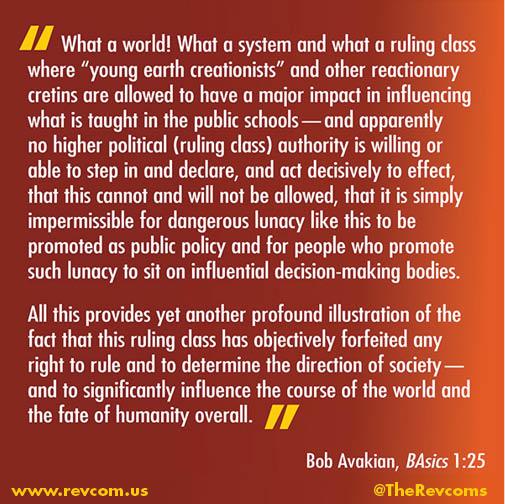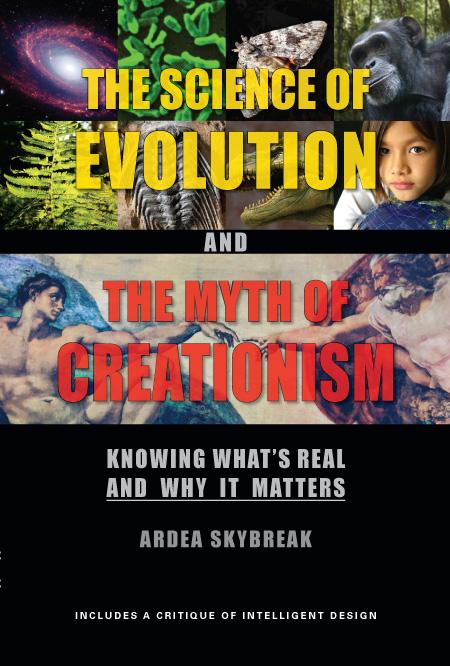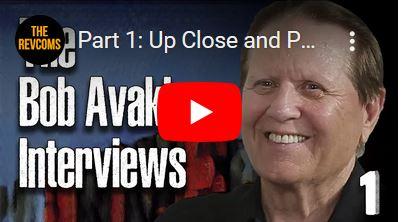EDITORS' NOTE: The theory of evolution—how and why very primitive one-celled organisms gave rise to the wondrous variety of life we have today and, as part of that, how we humans came into being—is one of the greatest and most important achievements of human knowledge. It is a joy to understand and an extremely important part of knowing—and changing—the world. Ardea Skybreak’s The Science of Evolution and The Myth of Creationism: Knowing What’s Real and Why It Matters goes deeply into this in a way that is both very accessible and captures the awe that comes from understanding how life came to be.
In addition, there is no better introduction to the scientific method—a method that enables people to get to the truth. This method can and must be applied to all natural processes and spheres of activity, including human society, to grasp how things came into being and how they can change. At a time when the scientific method is under attack from all sides—from Christian-fascist lunatics to woke post-modernists, not to mention liberal relativists—this book is more important than ever.
Reality and Distortions of Reality—Objective Truth and Subjective Influences
From The Science of Evolution and The Myth of Creationism Knowing What's Real and Why It Matters (pp. 216-18)
The philosopher Robert Pennock, who has written a very useful and interesting book showing what’s wrong with the Intelligent Design and other creationist arguments from both a scientific and philosophical/methodological perspective (The Tower of Babel: The Evidence Against the New Creationism) makes the point that the “Intelligent Design” Creationists (IDCs), in their attack against “scientific naturalism,” fall into classic “postmodernist” deconstructionist misinterpretations of the work of Thomas Kuhn. Thomas Kuhn was an influential philosopher and historian of science who argued, starting in the 1960s, that the way scientists choose what conceptual and theoretical framework (what “paradigm”) they should apply in framing their scientific questions and in seeking to resolve scientific puzzles is necessarily heavily influenced by subjective factors, including prevailing social norms and conventions. Unfortunately, some people misinterpreted that to mean that therefore there is no objective scientific truth at all, that all truth is necessarily subjective and therefore that any one scientist’s theory is pretty much as good as any other’s.
As Pennock points out, Kuhn himself didn’t agree with that and tried to point out that this is not at all what he meant to say, and that scientific truths themselves are objective (not subjective), and truth itself is not relative—he clarified that he simply meant that scientists are necessarily influenced by subjective factors, even in the choosing of what kind of conceptual framework and method they use to try to get at the objective truth of things. Nevertheless, despite Kuhn’s protestations, it is, according to Pennock, that initial misinterpretation of Kuhn’s views which seemed to spread widely throughout academic circles, where it went on to influence the development of “deconstructionism” in literary circles. Deconstructionism refers to a method of reading and discussing texts that emphasizes the multiplicity of possible readings and interpretations of any given text and the subjective influences which any reader (as well as any author) can bring into any text. For the deconstructionist there can therefore be many possible “truthful” interpretations of any one text or work of art (“your truth” can be different from “my truth” in deconstructionist approaches).
The so-called “post-modernist” deconstructionists took this even further, basically arguing that there is no such thing as “objective” truth, because the fact that each person brings their own subjective interpretations to things makes it impossible to ever know anything other than through this distorted subjective lens. As Pennock points out, the post-modernist deconstructionists argue that when people think something is true “it is only because one or another particular group—because of their position, prestige or power—has been able to establish and enforce their own view.” In such a view all truth is relative, and “power relations” determine what we call truth at any given time. (For more on this see Pennock’s Tower of Babel: The Evidence Against the New Creationism.)
By contrast, the method of dialectical and historical materialism (which is the viewpoint and method upheld and applied by communists) agrees that subjective influences (including social values and conventions and class-influenced outlooks and methods, especially when concentrated in the hands of people wielding power) can and do distort perceptions of the actual truth of things and that it is important to recognize and identify these subjective distortions; but that doesn’t mean that all truth is relative or that it is not possible to discover the actual objective truth about the way things really are in nature and society. The notion that all truth is relative is a recipe for idealist paralysis that just gives up on trying to deeply understand how reality really is (independently of people’s notions of it) and how people might consciously attempt to affect that reality.
To get at the objective truth of things, what is required is the application of a consciously and consistently scientific method which repeatedly grapples with objective reality and tests and transforms it to see whether or not it conforms to predictions we make about how it actually is at any given point, and in what ways it may be changing and developing. Yes we do all bring our subjective influences and outlooks to the task; but the actual truth of things (in actual objective reality) is there, whether we interact with it or not, and regardless of any of our subjective opinions and preconceived notions. In contrast to subjective idealism or other forms of philosophical idealism (which includes beliefs in a supernatural realm existing above and beyond the sphere of actual material reality), it is science—a scientific outlook and method—which we must apply if we want to find out the actual truth of things.
What is science and why is it so important?
An excerpt from the Bob Avakian Interviews on The RNL—Revolution, Nothing Less!—Show
Unfortunately, as Pennock explains, postmodernist relativism tends to view science itself as just another “narrative and interpretive activity” (much like the writing of literary texts or other artistic pursuits) and these relativists conclude from this that scientific truths “are not objective but are constructed by power relations and prejudices.” Here again, two things are being confused, or “jumbled together”: the reality that human beings bring subjective outlooks and interpretations to everything they do, including in science, and that we should try to consciously sort these out; and, on the other hand, the basic fact that objective reality does exist independently of human beings and that by becoming more fully conscious of what constitutes a genuine scientific method and aware of methodological errors to avoid, human beings can actually zero in more and more closely (even if never perfectly) on the actual truth of things. How could we ever make concrete scientific advances and transform reality in line with our intended objectives (as in the development of antibiotics, to use just one example) if objective reality didn’t really exist and if human beings were totally powerless to determine with a fair degree of confidence the objective truth corresponding to that actual reality?
The more traditional “scientific Creationists” try to argue as if they believe it’s OK to use the usual methods of scientific investigation because when you do that you can come up with “evidence” that evolution didn’t happen, so therefore the story of a Creator god told in Genesis must be right. In reality, they don’t apply a genuinely scientific method, nor do they have any legitimate scientific evidence that could possibly support their viewpoint (they mainly make up absurd claims based on nothing, such as the idea that the order of the fossils in different rock layers represents the order in which different animals drowned during the Biblical Flood!). They mainly try to make people take their word for it that evolution isn’t a solidly supported theory in the hopes that people will allow them to propose their religious alternative in the science classrooms. But they’d still like people to believe that their creationist views are compatible with modern scientific methods.
But a number of the Intelligent Design Creationists are actually even more fundamentally anti-science than some of their Biblical literalist brethren, even though this may not always be immediately obvious. However if you study what they say and write, you will see that some of them at least (especially Phillip Johnson and his followers) actually want to overthrow the whole way science is usually done! They want scientific knowledge to somehow be attained “through” religion, and therefore they want scientific methods to reflect this goal by incorporating the idea of God right into the pursuit of science—the replacement of the methods of standard “naturalistic science” with “theistic science” (science driven by God) is the openly stated goal of at least their preeminent ideologue, Phillip Johnson. And they want access to the science classrooms of high schools and even universities in order to accomplish this stupendous “paradigm shift.”

The philosopher Robert Pennock makes a convincing case for the notion that this new breed of Creationists have been very much influenced by postmodernist relativism.*
Phillip Johnson himself is a law professor who identifies himself as a “postmodernist deconstructionist” and denies that natural science can get to the actual objective truth of anything. He sees the theory of evolution as just one subjectively interpreted story, which happened to become dominant since Darwin’s time simply because the scientific community managed to politically suppress the teaching of alternative theories such as the theory of divine design. He calls on people to free themselves from the supposed tyranny of naturalistic science and its materialist rules of evidence. He argues that  we can’t get at the truth of things through “naturalistic” science—that this can only be done in the end through knowing God. “Truth” in his view does exist, but it is only the truth of divine revelation!
we can’t get at the truth of things through “naturalistic” science—that this can only be done in the end through knowing God. “Truth” in his view does exist, but it is only the truth of divine revelation!
It is important to realize that this is what the Intelligent Design Creationists want to smuggle into the science classrooms, to be given “equal weight” with the theory of evolution, a scientific theory which, unlike “Intelligent Design,” has been repeatedly tested and verified (over and over and over again!) through concrete scientific observations and experiments. It is completely unconscionable to allow the obviously religious theory of “Intelligent Design” (which has never produced even a single legitimate scientific research article in a single legitimate peer-reviewed scientific journal) to be taught to our children as science. Today, the proponents of “Intelligent Design” (supported by people in positions of highest authority, right up to the president) have succeeded in confusing many people into thinking that the theory of evolution is on shaky ground and is controversial in the scientific community (when nothing could be further from the truth!); they have successfully lobbied to get some textbooks rewritten to reflect their crackpot theory; they have rammed their program through some school boards; they have launched lawsuits to try to undermine the separation of church and state; and, increasingly, they are succeeding in getting the mainstream media to grant them legitimacy and treat their theory as if it were serious science. But none of this changes the simple fact that “Intelligent Design” is not and has never been science. It is religion. And any political successes its proponents may achieve in connection with the advance of a reactionary social agenda cannot change the fact that Intelligent Design does not have a shred of scientific credibility.
_____________________
* The article “Marxism and the Enlightenment,” by RCP Chairman Bob Avakian, also contains a very interesting and relevant discussion of this and related questions. [This article appeared in the Revolutionary Worker #1029 (December 2, 2001), and is posted at revcom.us; and it has been included in the book Observations on Art and Culture, Science and Philosophy by Bob Avakian (Insight Press, 2005)] [back]

